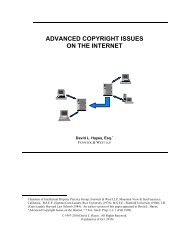International Tax Aspects of Foreign Currency Transactions
International Tax Aspects of Foreign Currency Transactions
International Tax Aspects of Foreign Currency Transactions
Create successful ePaper yourself
Turn your PDF publications into a flip-book with our unique Google optimized e-Paper software.
(a)Certain cases have addressed a Mexican government program toinduce corporations to retire its Dollar-denominated debt. In each<strong>of</strong> the cases, the corporation purchased the debt at a discount onthe open market. Then, the Mexican government exchanged alarger amount <strong>of</strong> pesos with the company which were restricted foruse inside Mexico.(b) Kohler v. United States, 2006-2 USTC para. 50,611 (7 th Cir.)(Posner, J.). Here, the company bought back $22 mm face value <strong>of</strong>debt for $11 mm. The Mexican government swapped the debt for“restricted” pesos that would be worth $19.5 mm if unrestricted.The Court viewed Kohler as receiving a taxable gain on retirement<strong>of</strong> the debt. However, contrary to the IRS’ conclusion, the fact thatthe pesos were restricted for use inside Mexico meant that theirFMV must have been less than $19.5 mm. The IRS’sdetermination <strong>of</strong> a value <strong>of</strong> $19.5 mm was implausible andarbitrary and capricious.(c)G.M. Trading Corp. v. Commissioner, 121 F.3d 977 (5th Cir.1997). Similar transaction as above. However, the Fifth Circuitanalyzed the transaction as a non-shareholder contribution tocapital under § 118. Thus, the taxpayer received the excessamount <strong>of</strong> pesos tax-free, but also did not receive tax basis for thatamount <strong>of</strong> value.D. Restricted or “Blocked” Currencies.(1) <strong>Foreign</strong> exchange restrictions may completely block a US taxpayer’sability to remit funds from a foreign country. This may create a harshresult under subpart F or § 482 in charging the taxpayer with phantomincome that it cannot by law receive in cash. While case law ruled againstthe taxpayers on this point, 35 the regulations now permit taxpayers to electto defer reporting <strong>of</strong> income attributable to blocked currency.(2) Reg. § 1.482-1(h)(2).(a)<strong>Tax</strong>payers transacting with a subsidiary operating under foreignexchange restriction may elect to defer reporting the incomeattributable to the blocked currency until it can be remitted underforeign law. The election to defer reporting applies to “any portion<strong>of</strong> the arm’s length amount,” 36 including stated payments.However, if the payments may be remitted through any other3536See Eder v. Commissioner, 138 F.2d 27 (2d Cir. 1944) (“blocked” Colombian pesos could be taxed to anindividual under the foreign personal holding company rules).Reg. § 1.482-1(h)(2)(iv).48© 2013 William R. Skinner, Esq.Fenwick & West LLPwrskinner@fenwick.com
















